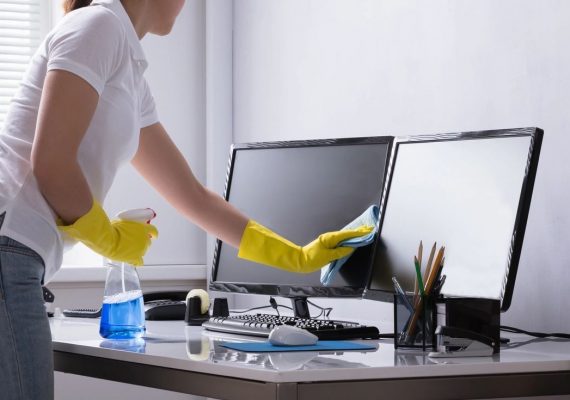If you needed a productivity booster for the week, this might be for you.
If your office is messy, today’s ‘National Clean Off Your Desk Day’ is an apt reminder to declutter both your workspace and mind.
While the national day’s origin cannot be traced, it is believed to be a post-Christmas and New Year’s holiday, encouraging workers to start off their return to the office on a clean slate, or, more accurately, clean desk.
If the holiday is not enough to convince you to clean up your desk, studies might be more encouraging.
Offices can actually contain more than 500 species of bacteria living in an average office, per findings by San Diego State University in 2012.
The university found that men’s workspaces contain 10-20% more germs than women’s, with bacteria living on desks, keyboards and door handles for at least 24 hours. The lack of sanitation is likely the result of germs among coworkers, possibly leading to more illnesses among employees.
While the findings date back to pre-Covid days, it might be another reason to double-up the sanitisation at workspaces given the continuous presence of the pandemic—especially when getting sick can hinder one’s productivity.
Beyond the mere importance of hygiene, other studies have found a link between cleanliness and work efficiency.
This was among the findings by Princeton University, which concluded that a messy environment slows down cognitive functions, draining employees as a result. The chaotic setting of one worker can also affect their counterpart with a neater desk.
Those who heavily rely on paperwork are also prone to be messier due to paper being scattered across the office, leading to more time wasted searching for them when needed. This reduces productivity and slows down the completion of a task.
Even those who rely on online documents are in need of cleaning up their desktops as time can also go to waste searching for required files.
On an external level, an office’s cleanliness can reflect on a company. Studies, cited by London-based hygiene company Tork, found that 72% of employees are “reluctant to recommend” a firm with low hygiene to job seekers.
Another 70% believe that poor hygiene affects “their overall job satisfaction, Tork added.
Cleanliness and the brain
Apart from the general importance of cleaning the office space and maintaining work etiquette, the mess surrounding us can seep its way to our brains—this is according to studies.
A separate study by the International Sanitary Supply Association found that 88% of 1,481 respondents attributed their concentration and productivity rate to the cleanliness of their offices.
In 2019, Libby Sander, assistant professor of organisational behaviour at the Bond University Business School, found that, generally, physical environment affects “cognition, emotions and behaviour” as well as decision-making abilities and relationships.
“Cluttered spaces can have negative effects on our stress and anxiety levels, as well as our ability to focus, our eating choices, and even our sleep,” Sander wrote for Harvard Business Review at the time.
Citing scientists at the Princeton University Neuroscience Institute, Sander noted that the human brain generally likes order and cleanliness serves as “a visual reminder” to some form of neatness.
“It’s possible that cluttered offices may produce employees who make poor eating choices during breaks and spend less time actually working,” Sander added.
Collectively, all studies pointed to one thing that you need to do: clean up your space regularly.
“Avoid letting things get so bad that you start cleaning as a form of procrastination. If you work at home, maintaining a designated workspace can help create a boundary between work items and home items,” explained Sander.







